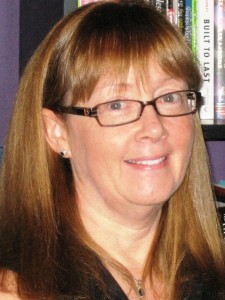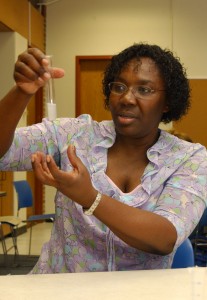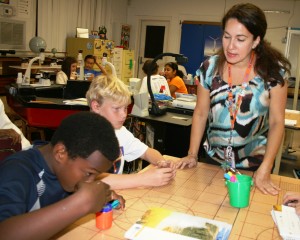College honors 5 newly retired faculty: Algina, Clark, Echevarria-Doan, Sherrard and Spillman
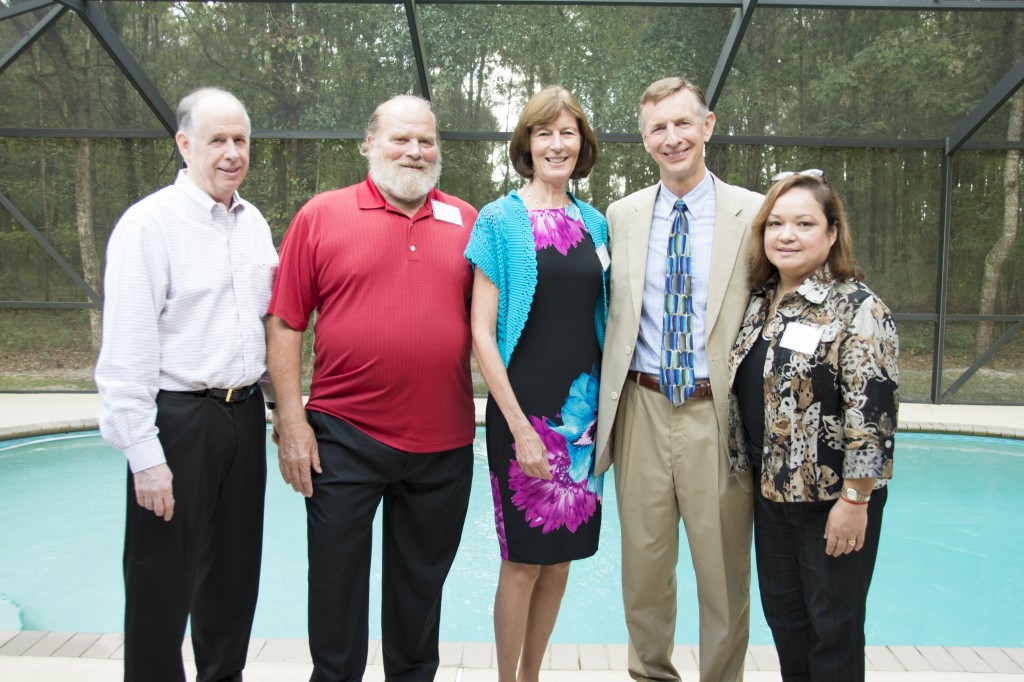
College of Education Dean Glenn Good (second from right) celebrates with retired faculty (from left to right) Drs. James Algina, Peter Sherrard, Mary Ann Clark and Silvia Echevarria-Doan at the college’s Retired Faculty Luncheon on Oct. 16.
The College of Education on Oct. 16 honored five newly retired professors who have made significant contributions to their students, their professions and research fields, and the EduGator community.
Dean Glenn Good hosted a reception at his home for all retired faculty in the area to recognize the newest members of their ranks. They are Drs. James Algina (research and evaluation methodology); Mary Ann Clark, Peter Sherrard and Silvia Echevarria-Doan (all in counselor education), and Carolyn Spillman (Teacher Leadership and School Improvement).
View photos of the event by clicking here.
The following mini-profiles represent just a small sampling of their many career achievements and the impact they each have had on the college, their students and in their professions.
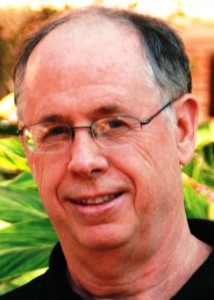 Dr. James Algina
Dr. James Algina
Professor of research and evaluation methodology
James Algina has been on the College of Education faculty for 35 years, chairing the foundations of education department from 1983 to 1995. He was named a University of Florida Research Foundation Professor in 2001 and is a fellow of the American Educational Research Association and of the American Psychological Association. He has authored more than 130 refereed articles, two books, eight book chapters, and six encyclopedia articles. Algina has been the editor of the Journal of Educational Measurement and associate editor of the American Educational Research Journal. He received his bachelor’s degree in psychology from University of Rhode Island and a Doctor of Education degree from the University of Massachusetts in psychometrics and statistics.
Algina says one of the most rewarding parts of his career was the time spent working with doctoral students and faculty. He has served as the supervisory chair for 20 doctoral students and co-chair for five. He was also a supervisory committee member for almost 200 doctoral students in 22 doctoral programs and for 44 graduated master’s thesis students. His dedication earned him a UF Doctoral Mentoring Award in 2009.
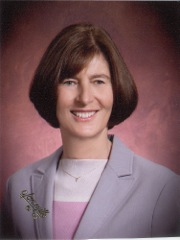 Dr. Mary Ann Clark
Dr. Mary Ann Clark
Professor emeritus in counselor education, school counseling program coordinator
Mary Ann Clark has been teaching in counselor education at UF since 2000, serving as the school counseling program coordinator for five years. She has chosen phased retirement and will continue as a part-time instructor in counselor education. Her research has focused on male underachievement in public education, counselors as educational leaders, factors in the success of poor and minority students, international collaboration, and school-university partnerships. The College named Clark the 2006-2009 B.O. Smith Research Professor, and the 2008 Graduate Faculty Teacher of the Year. She has participated in more than 100 presentations and publications since 1997, and she has been involved in a number of professional organizations and committees.
Clark worked for 13 years as a school counselor and administrator with the U.S. Department of Defense Dependent Schools on military bases in England. She received her bachelor’s in psychology from Wake Forest University and her master’s in guidance and counseling from the University of North Carolina. She graduated from the UF’s College of Education with her specialist and doctoral degrees in counselor education.
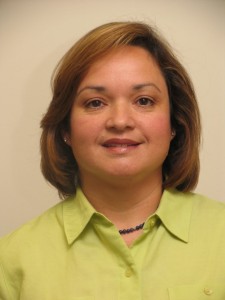 Dr. Silvia Echevarria-Doan
Dr. Silvia Echevarria-Doan
Associate professor of counselor education
Silvia Echevarria-Doan has been a member of the counselor education faculty for 20 years. She has decided to go on phased retirement to continue as part-time faculty. She headed that program area in 2011-12 and has coordinated the marriage and family counseling track for the past seven years. She has also served as clinical coordinator of the Advanced Family Couple and Family Clinic since 1994. She has presented worldwide at professional conferences and has received numerous awards for her scholarly work in areas such as family resilience and strength in family therapy, multicultural issues in family therapy, qualitative research methodology, and relationship violence.
Echevarria-Doan is an affiliate faculty member for UF’s Center for Women’s Studies and Gender Research. She is president of the North Central Florida Association for Marriage and Family Therapy and is a clinical fellow and an approved supervisor in the American Association for Marriage and Family Therapy. She is dually licensed as a marriage and family therapist and clinical social worker in Florida. She has a bachelor’s in psychology, a master’s in social work, and earned her Ph.D. in marriage and family therapy at Purdue University.
 Dr. Peter A.D. Sherrard
Dr. Peter A.D. Sherrard
Associate professor emeritus of counselor education
Peter Sherrard has been with the College of Education since 1986, when he began teaching in the marriage and family therapy and mental health counseling programs. Previously, he worked as a counseling psychologist for several university counseling centers, including six years as director at Kansas State University, one year at the University of Missouri-Columbia, and five years as training director for the psychology internship program at Southern Illinois University-Carbondale. At those schools, he also served as an adjunct assistant professor in their respective counselor education graduate programs. Sherrard has more than 40 years’ experience as a marital and family therapist in both agency and independent community practice.
Sherrard has been involved in dozens of publications, presentations, workshops and professional societies. He has served on the Florida 491 board that administers two of the licenses that UF counselor education students can qualify for, and is a former president of the American Association of State Counseling Boards. He earned his Doctor in Education degree from the University of Massachusetts-Amherst and completed his marriage and family training at the Menninger Clinic in Topeka, Kan.
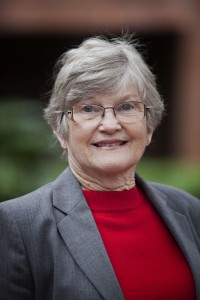 Dr. Carolyn Spillman
Dr. Carolyn Spillman
Clinical assistant professor, professor-in-residence in Collier County for TLSI program
Carolyn Spillman was a professor-in-residence in Collier County for the college’s Teacher Leadership for School Improvement program for three years, recruiting, teaching and mentoring teachers from high-needs schools across the county. She has spent almost 50 years as an instructor in elementary, secondary and post-secondary classrooms. She taught childhood education at the University of South Florida for 20 years, an also taught at Florida Gulf Coast University, which last year honored her with professor emeritus status.
Spillman has published a number of journal articles and conference papers with her colleagues. She was a member of several professional organizations and is a former president of the Florida Association for Childhood Education International.
She received her bachelor’s degree from High Point College and graduated from the University of North Carolina with a master’s in elementary education and a doctorate in child development and family relations. She also completed post-doctoral coursework at the University of South Florida at Fort Myers and at Tampa, as well as East Carolina University.
CONTACT:
WRITER: Alexa Lopez, news and communications office, UF College of Education; aklopez@coe.ufl.edu

